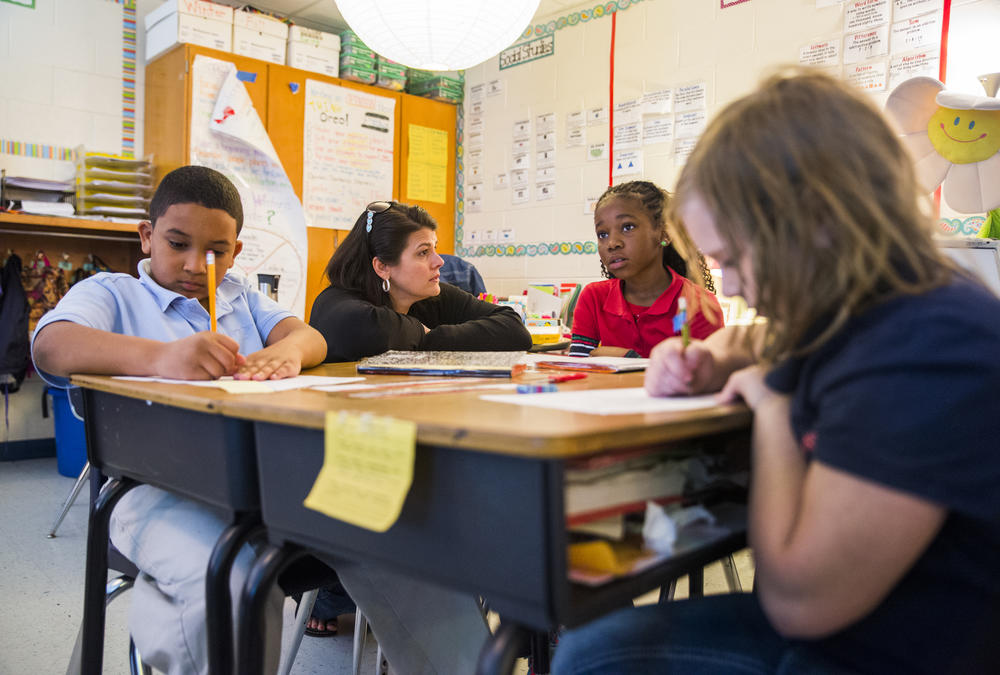Section Branding
Header Content
Modest Improvement In Georgia's High Stakes Test
Primary Content
On average, scores released in the 2017 Georgia Milestones end of year test show incremental but positive improvement for schools across the state. Look past the big picture, though, and schools still have ground to make up.
Take third grade literacy, largely held as one of the best predictors of future academic achievement. Third grade literacy ranged from being almost universal in some suburban schools to being largely absent elsewhere.
Overall the state saw a two percentage point drop in third graders definitely reading below grade level, from 33 percent in 2016 to 31 percent this year.
Some school districts, like Talbot County Schools in Southwest Georgia, showed even better year over year gains moving from 75 percent of third graders reading below grade level in 2016 to 68 percent this year.
“Basically, we’re very optimistic about our testing,” said Talbot County superintendent Jack Catrett.
However, Talbot County is at the bottom of the list of school districts that lagged the average in third grade literacy. Most of those districts run South from the Fall Line. Like Talbot County, many of those districts only have one elementary school.
“[Milestones scores say] to people, maybe we’re not as good. Well, we know that we’re real good and that our kids get a real good education. We take them where they are, and we do great with them,” Catrett said.
Like Talbot County, many of the South Georgia districts showed marked improvement from 2016.
Less than half of charter schools green lit by the state outperformed the Georgia third grade literacy average. State chartered Cirrus Academy in Macon suffered most, lagging the literacy measure by 38 percent with 69 percent of third graders below grade level in reading. That's well off the pace of surrounding Bibb County Public Schools.
A little more than half of the schools chartered by their local school districts outperformed the state average. However, the elementary school with the single worst rate of third grade literacy is Jenkins-White Elementary Charter in Richmond County where 86 percent percent of third graders aren't reading well.
The third grade literacy average for Georgia's charter schools, both state approved and locally approved, was exactly that of all Georgia schools.
Two Atlanta Public Schools elementary schools, Boyd Elementary School and Thomas Heights Elementary School, are right behind Jenkins-White in literacy with better than 80 percent of third graders reading below grade level.
That's part of a trend in which the lowest performing individual schools in the third grade reading measure are found in Georgia's urban areas. The best performing schools are almost all suburban Atlanta schools.
Atlanta Public School superintendent Meria Carstarphen acknowledged that her district’s scores weren’t all positive.
Still, she says the tests are still too new to take their results as gospel.
“The Milestones are a quality litmus test for what we’re doing and can be great for giving us feedback, but I think because of a lot of clunkiness still in the implementation, we need to restrain ourselves from using [the scores] in solely punitive ways,” she said.
Scores for high school students in STEM related subjects held steady. Less than a third of high school students were found to be absolutely deficient in classes like Geometry, Coordinate Algebra and Physical Science.
That’s troubling to Matt Cardoza. He works with the policy group Georgia Partnership for Excellence in Education.
“With science being so critical for STEM jobs and workforce in later years, I think that’s a focus that we need to keep in view--to see what’s happening in science,” he said.
The Georgia law that says third, fifth and eighth graders who under perform on Georgia Milestones cannot be promoted to the next grade is off the table this year. All but six school districts and every charter school in the state were granted waivers that exempt them from that law.
Georgia students first took the Milestones tests in 2015. They replaced other end-of-year assessments like the Criterion-Referenced Competency Tests, End of Course Tests, and the Georgia Writing Assessments.



